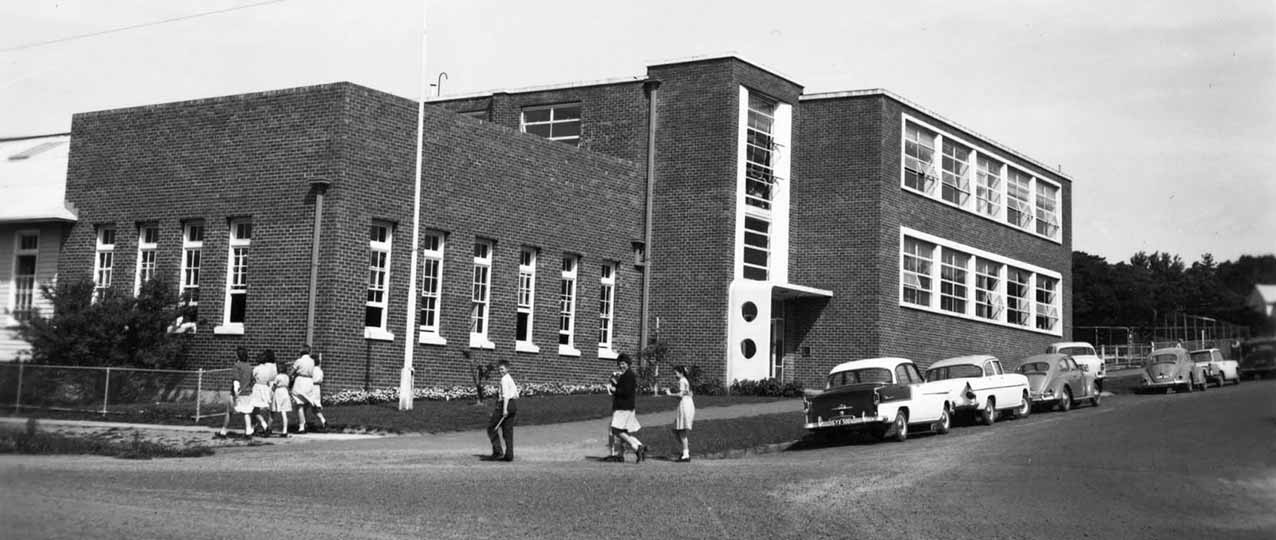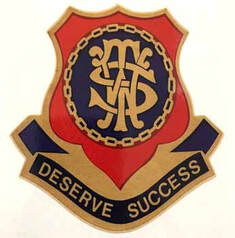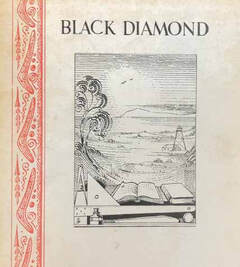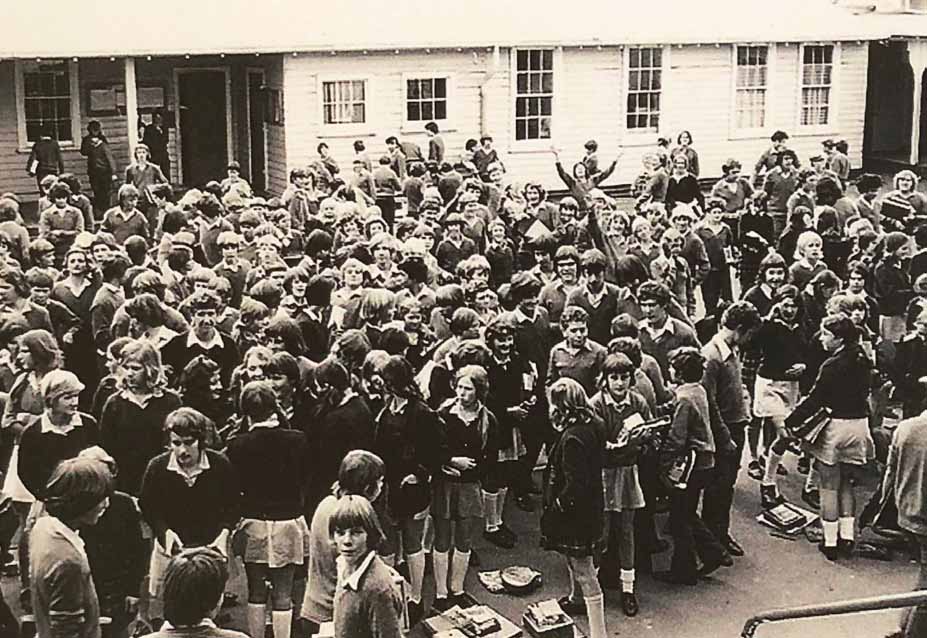 Wonthaggi Technical School, 1963
Wonthaggi Technical School, 1963 By Bruce Phillips
I ONLY lived in Wonthaggi for a total of 18 years but they were years that had a profound effect on me. My parents – Jack and Agnes Phillips – had a grocery at 72 McBride Avenue where South Gippsland Photographic now is. My first recollection of the “Tech” was standing outside our shop and looking up at an imposing brick monolith. Miss (Win) Baker’s music room was located in that building – right on the corner of Watt Street and McBride. In the warmer weather the songs would drift out of that room and down McBride Avenue.
I ONLY lived in Wonthaggi for a total of 18 years but they were years that had a profound effect on me. My parents – Jack and Agnes Phillips – had a grocery at 72 McBride Avenue where South Gippsland Photographic now is. My first recollection of the “Tech” was standing outside our shop and looking up at an imposing brick monolith. Miss (Win) Baker’s music room was located in that building – right on the corner of Watt Street and McBride. In the warmer weather the songs would drift out of that room and down McBride Avenue.
I attended the primary school in Billson Street from 1959 to 1965. These were the years when we were forced to drink a small bottle of milk each day, our classrooms were heated by an open fire and we marched to the beat of what passed for a school band.
|
Incredibly, we had our own swimming pool – built by the local community. We regarded ourselves as very special as few government schools then – and even now – had their own pools. These days it is a beautiful sky blue and well maintained. In the early 60s it was the colour of the Yarra with a slimy bottom but we did not care because it provided endless hours of fun.
|
This essay was first published in The Plod, the newsletter of the Wonthaggi & District Historical Society. It's based on a speech to the Wonthaggi Historical Society’s annual dinner at which Bruce Phillips talked about how his time at the Wonthaggi Tech-High contributed to employment, experiences and success in later life. |
A special teacher was Joe Chambers, whom I had in grade 5, and who taught us how to swim and lifesaving. I still have my “Herald Learn To Swim Certificate”. Joe helped me struggle across several widths of the pool for the required 25 yards. He and his wife Lyn - who was also a teacher - were both pioneers for the Wonthaggi Historical Society over many years and left a massive legacy.
In 1966 - as a pimply-faced 12-year-old - I joined the big kids at the Tech school – a place where they welcomed boys on day one by sticking their head in a toilet bowl and pulling the chain.
The kids came from as far afield as Phillip Island, Grantville, Krowera, Kongwak and Inverloch. Some were from broken families and resided at the long-gone - but not-missed - Newhaven Boys Home. If I ever thought life was tough, I only had to look at them to be reminded of how lucky I was.
In 1966 - as a pimply-faced 12-year-old - I joined the big kids at the Tech school – a place where they welcomed boys on day one by sticking their head in a toilet bowl and pulling the chain.
The kids came from as far afield as Phillip Island, Grantville, Krowera, Kongwak and Inverloch. Some were from broken families and resided at the long-gone - but not-missed - Newhaven Boys Home. If I ever thought life was tough, I only had to look at them to be reminded of how lucky I was.
More than 900 students were crammed into the McBride Avenue campus. On the Baillieu Street side was a long line of humped earth where the students had helped excavate a trench during World War Two. A cousin of mine - Ron Tinkler - helped dig the trench. He loved it because it got him out of maths class.
Wonthaggi - as a mining town - was considered a Japanese target. How ironic it was that the first Japanese to eventually “invade” the school grounds was a friendly young student called Toshio Mahashi who spent 1962 and 1963 in our town. Toshio developed an obsession for the movie The Sound of Music and watched it multiple times. He has maintained a life-long connection through our friend Jill Miles, who thankfully has recorded in detail Toshio’s memories of our town.
Each morning before class I would sit with my brother Greg and some older boys on what was called the pavilion on the Baillieu Street side. I couldn’t work this out because when you perched on the terraced seats there was no view of a sporting field – just a bunch of portable classrooms. What was once the school oval was covered in red stone from the mine with occasional spots of grass growing through.
Every boy loved woodwork and our first teacher was the legendary Bill Robertson. He came from Melbourne in the late 50s and once told us that when he was appointed to Wonthaggi he had responded – “No, I’m not going there. No way!” But he did go and he never left, establishing a fine family and serving as mayor. Many remember his farewell almost five years ago. It was standing room only and a testament to how Wonthaggi regarded one of its greats. In year 11 Bill told me I had made an indelible mark on the school but not one to be proud of – having drilled through my model leaving five inch-wide holes in the workbench.
Another woodwork teacher was the softly-spoken Johnny Lindsay (OAM). The first thing he would tell a new class was not to do silly things with power tools. He would then hold up the hand missing all the fingers he had lost in a mine workshop accident. Needless to say, the boys got the message.
No one would ever forget another trade teacher - Clinton Shiells - who was completely bald and referred to by all as “Chrome Dome”. He would roam along the lines of school assemblies looking for kids who hadn’t polished their shoes. Mr Shiells loved dispensing his form of justice with a stiff leather strap. He reputedly cried when corporal punishment was banned. It was customary in those days for classes to give their form teacher a Christmas present. One year Mr Shiells’ class quietly – and without ceremony - left his on his desk. He opened it to find a tin of Wunderwax and a comb with no prongs.
At least Mr Shiells was not like one other trade teacher, a rather large fellow who delighted in confiscating cream buns from students - and eating them. It was a good for the boys’ diet but not for his.
The school was so overcrowded it commandeered unused classrooms at the primary school in King Street. Each day through 1966 and 1967 we’d march to what had become known as “Siberia”. Most fitting because it was freezing cold, unfriendly, soulless and with all the charm of a Russian gulag.
Wonthaggi - as a mining town - was considered a Japanese target. How ironic it was that the first Japanese to eventually “invade” the school grounds was a friendly young student called Toshio Mahashi who spent 1962 and 1963 in our town. Toshio developed an obsession for the movie The Sound of Music and watched it multiple times. He has maintained a life-long connection through our friend Jill Miles, who thankfully has recorded in detail Toshio’s memories of our town.
Each morning before class I would sit with my brother Greg and some older boys on what was called the pavilion on the Baillieu Street side. I couldn’t work this out because when you perched on the terraced seats there was no view of a sporting field – just a bunch of portable classrooms. What was once the school oval was covered in red stone from the mine with occasional spots of grass growing through.
Every boy loved woodwork and our first teacher was the legendary Bill Robertson. He came from Melbourne in the late 50s and once told us that when he was appointed to Wonthaggi he had responded – “No, I’m not going there. No way!” But he did go and he never left, establishing a fine family and serving as mayor. Many remember his farewell almost five years ago. It was standing room only and a testament to how Wonthaggi regarded one of its greats. In year 11 Bill told me I had made an indelible mark on the school but not one to be proud of – having drilled through my model leaving five inch-wide holes in the workbench.
Another woodwork teacher was the softly-spoken Johnny Lindsay (OAM). The first thing he would tell a new class was not to do silly things with power tools. He would then hold up the hand missing all the fingers he had lost in a mine workshop accident. Needless to say, the boys got the message.
No one would ever forget another trade teacher - Clinton Shiells - who was completely bald and referred to by all as “Chrome Dome”. He would roam along the lines of school assemblies looking for kids who hadn’t polished their shoes. Mr Shiells loved dispensing his form of justice with a stiff leather strap. He reputedly cried when corporal punishment was banned. It was customary in those days for classes to give their form teacher a Christmas present. One year Mr Shiells’ class quietly – and without ceremony - left his on his desk. He opened it to find a tin of Wunderwax and a comb with no prongs.
At least Mr Shiells was not like one other trade teacher, a rather large fellow who delighted in confiscating cream buns from students - and eating them. It was a good for the boys’ diet but not for his.
The school was so overcrowded it commandeered unused classrooms at the primary school in King Street. Each day through 1966 and 1967 we’d march to what had become known as “Siberia”. Most fitting because it was freezing cold, unfriendly, soulless and with all the charm of a Russian gulag.
 The school motto
The school motto Two standout teachers in those days were Don McLeod and his wife Rosemary. They were ahead of their time fostering an Aboriginal boy - who was my age - called Claude. This was the first occasion any of us had any kind of encounter with an indigenous Australian. Over the next few years, we discovered this country was a lot more than just Captain Cook. It was an Australian history teacher in my final year, Andrew McCrae, who opened my eyes to how indigenous people had really been treated.
For the past 29 years I have been Director of Public Information for the Federal Court of Australia and our native title determinations have taken me to some of the most remote places on the mainland and in the Torres Strait – places many will never go. One was Tjuntjuntjara in the Great Victoria Desert, 650kms north east of Kalgoorlie, home to the Spinifex people; Nookanbah in the Kimberleys; Aurukun in far north Queensland and the Murray Island where Eddie Mabo is buried. They are without exception highly emotional occasions. The elders always cry. These experiences are an incredibly important part of a journey that began for me in Wonthaggi.
In 1968 I chose typing and communications as an elective. Our teacher was the wonderful Alma Moon. Every Tuesday just after lunch we delighted when Mrs Moon said “Good Afternoon class.” and with much delight we would respond: “Good afternoon . . . Mrs Moon.” Then the record would go on – “Ding Dong the Witch is Dead”, “Bonnie and Clyde”, “Puppet on a String” and we would belt the typewriter keys in time with the music. Frances Noonan from Cowes was streets ahead of the rest of the class. I wasn’t very good but I learnt to use all the keys, never realising how handy that would be when 11 years later I began my journalism career at WA Newspapers in Perth.
By 1967 the decision had finally been made to build a new high school at Dudley resulting in two separate schools – the Tech and High – operating at Mc Bride Avenue. A man called Kevin Clark was our new high school principal and someone I liked.
However, when we finally moved to Dudley at the beginning of 1969, Mr Clark had been banished to Sea Lake and one John Evans – known by the students as JB due to his business-like and authoritarian manner – took over.
The first day in our brand new school dawned and we proudly lined up for assembly. Even parents were in attendance for the happy event. JB, however, was not in a festive mood. He ranted about graffiti and how there would be none of it at the new establishment. I began to reflect deeply on what he was saying. It occurred to me: had Mr Evans been told that - in an ill-fated and highly unsuccessful marketing campaign for the female cohort - someone had been writing the words “I love Bruce Phillips” on the desktops in McBride Avenue?
Another teacher became an enduring friend: Geoff Taberner still part-owns the Wonthaggi Hotel or what some refer to as “Taberners” or the “Whalebone”. Geoff - a talented musician and footballer - taught science and put up with me for one year. I clearly remember him telling us the human body starts to die once we reach 25. When I turned 25 I was standing in front of a mirror in Perth looking at flecks of grey hair and thinking – Mr Taberner was right. Geoff eventually wound up working for the director of public prosecutions and we would catch up in Melbourne’s legal precinct.
For the past 29 years I have been Director of Public Information for the Federal Court of Australia and our native title determinations have taken me to some of the most remote places on the mainland and in the Torres Strait – places many will never go. One was Tjuntjuntjara in the Great Victoria Desert, 650kms north east of Kalgoorlie, home to the Spinifex people; Nookanbah in the Kimberleys; Aurukun in far north Queensland and the Murray Island where Eddie Mabo is buried. They are without exception highly emotional occasions. The elders always cry. These experiences are an incredibly important part of a journey that began for me in Wonthaggi.
In 1968 I chose typing and communications as an elective. Our teacher was the wonderful Alma Moon. Every Tuesday just after lunch we delighted when Mrs Moon said “Good Afternoon class.” and with much delight we would respond: “Good afternoon . . . Mrs Moon.” Then the record would go on – “Ding Dong the Witch is Dead”, “Bonnie and Clyde”, “Puppet on a String” and we would belt the typewriter keys in time with the music. Frances Noonan from Cowes was streets ahead of the rest of the class. I wasn’t very good but I learnt to use all the keys, never realising how handy that would be when 11 years later I began my journalism career at WA Newspapers in Perth.
By 1967 the decision had finally been made to build a new high school at Dudley resulting in two separate schools – the Tech and High – operating at Mc Bride Avenue. A man called Kevin Clark was our new high school principal and someone I liked.
However, when we finally moved to Dudley at the beginning of 1969, Mr Clark had been banished to Sea Lake and one John Evans – known by the students as JB due to his business-like and authoritarian manner – took over.
The first day in our brand new school dawned and we proudly lined up for assembly. Even parents were in attendance for the happy event. JB, however, was not in a festive mood. He ranted about graffiti and how there would be none of it at the new establishment. I began to reflect deeply on what he was saying. It occurred to me: had Mr Evans been told that - in an ill-fated and highly unsuccessful marketing campaign for the female cohort - someone had been writing the words “I love Bruce Phillips” on the desktops in McBride Avenue?
Another teacher became an enduring friend: Geoff Taberner still part-owns the Wonthaggi Hotel or what some refer to as “Taberners” or the “Whalebone”. Geoff - a talented musician and footballer - taught science and put up with me for one year. I clearly remember him telling us the human body starts to die once we reach 25. When I turned 25 I was standing in front of a mirror in Perth looking at flecks of grey hair and thinking – Mr Taberner was right. Geoff eventually wound up working for the director of public prosecutions and we would catch up in Melbourne’s legal precinct.
 The school magazine, 1966, with cover design by Jim Glover, the art teacher and an accomplished artist and designer
The school magazine, 1966, with cover design by Jim Glover, the art teacher and an accomplished artist and designer I need to mention a couple of other teachers. One was Jill Miles – formerly known as Jill Glover. Jill’s dad was the famous and long-serving art teache, Jim Glover. Jill taught me geography. Geography is the study of places and the relationships between people and their environments – most appropriate as Jill was continually putting me in my place and reminding me of the need for a respectful relationship. It was a firm hand when I needed it.
The other was Sam Gatto who only taught me for one subject and for one year: Modern European History in 1970. I recall sitting up the back of class with the naughty boys for the first few lessons and then realising – this bloke is fascinating, passionate, charismatic and inspiring. Before I knew it I was voluntarily sitting in the front row hearing about Napoleon, Bismarck, Karl Marx – and eating out of his hand.
It all helped to stoke a life-long love of history in all its forms which – in the end – is why we’re all here.
The other was Sam Gatto who only taught me for one subject and for one year: Modern European History in 1970. I recall sitting up the back of class with the naughty boys for the first few lessons and then realising – this bloke is fascinating, passionate, charismatic and inspiring. Before I knew it I was voluntarily sitting in the front row hearing about Napoleon, Bismarck, Karl Marx – and eating out of his hand.
It all helped to stoke a life-long love of history in all its forms which – in the end – is why we’re all here.
